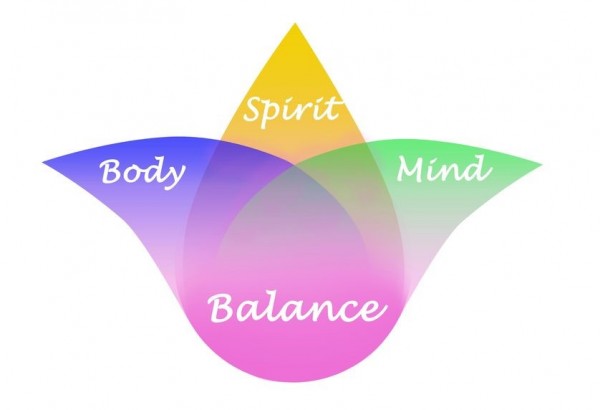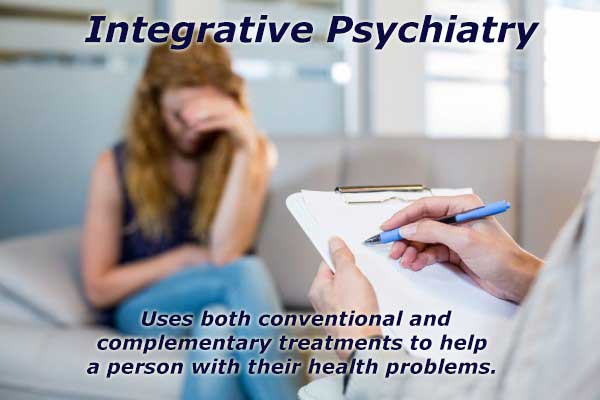
 For example, if a patient is dealing with ongoing depression, the integrative psychologist will ask questions to find the root of the problem, instead of just prescribing medication and ignoring the actual cause. Therefore, the psychiatrist would ask questions about whether the person is dealing with toxic relationships, unhealthy habits (diet, stress, lack of exercise), a recent trauma, and so on. Holistic Psychiatry takes into account a person’s mental, emotional, physical, social, spiritual, and environmental factors, because they all affect a person’s overall health. A psychiatrist may use multiple treatments in order to address all aspects of a person’s health.
For example, if a patient is dealing with ongoing depression, the integrative psychologist will ask questions to find the root of the problem, instead of just prescribing medication and ignoring the actual cause. Therefore, the psychiatrist would ask questions about whether the person is dealing with toxic relationships, unhealthy habits (diet, stress, lack of exercise), a recent trauma, and so on. Holistic Psychiatry takes into account a person’s mental, emotional, physical, social, spiritual, and environmental factors, because they all affect a person’s overall health. A psychiatrist may use multiple treatments in order to address all aspects of a person’s health.
Integrative medicine is different from alternative medicine, because alternative medicine is used as a replacement to conventional medicine. Integrative medicine is a patient-centered model that considers evidence-based pharmaceutical treatments as well as sociocultural factors, nutritional status, mind-body medicine, and preventative medicine in both the eradication of illness and the promotion of long-term wellness (Psychology Today, 2018).
An integrative psychiatrist can prescribe medication, but will focus first on finding the cause of the psychological issue, and then using the best conventional or complementary treatments (complementary include homeopathy, naturopathy, Ayurveda, Chinese medicine, acupuncture, herbs, dietary supplements, etc.) The goal of integrative psychiatry is to provide safe and effective treatments, and only to prescribe psychiatric medications when absolutely necessary.
This is a new and growing concept as people are starting to take a greater interest in holistic treatments, organic/natural foods and wellness as a whole.
OPTIMAL HEALTH SPECTRUMS/Integrative “Holistic” Psychiatry for Children, Adolescents and Adults. Retrieved from: https://www.optimalhealthspectrums.com/contents/integrative-care-menu/integrative-care/integrative-psychiatry
Psychology School Guide/How to Become a Holistic Psychiatrist. Retrieved from: https://www.psychologyschoolguide.net/psychiatry-careers/becoming-a-holistic-psychiatrist/
UPMC: LIFE CHANGING MEDICINE/Integrative Psychiatry. Retrieved from: https://www.upmc.com/services/integrative-medicine/services/integrative-psychiatry
Brown M.D., Gregory Scott. (2018, June 6). Psychology Today/Now is the Time for Integrative Psychiatry. Retrieved from: https://www.psychologytoday.com/us/blog/green-psychiatry/201806/now-is-the-time-integrative-psychiatry
Better help/What Are the Principles of Integrative Psychiatry. Retrieved from: https://www.betterhelp.com/advice/psychiatry/what-are-the-principles-of-integrative-psychiatry/
- Overall wellness is the goal – not just the absence of disease.

It’s not just about getting rid of the depression, anxiety, addiction, and so on. It’s about helping a person find happiness, and live a healthier and more enjoyable life all-around. - Healing power of relationships
The psychiatrist aims to develop a trusting relationship with the patient, where they feel they are being listened to and understood. It’s also important for the patient to fix any friendship or relationship issues that are keeping them from obtaining optimal health. - Addressing the mind, body and environment as a whole
The belief is that the body, mind, and the environment you're surrounding yourself with all operate in harmony (betterhelp). Anxious symptoms could be a result of a number of things; toxic relationships, a stressful job, or possibly a health issue in the body like irregular brainwaves. All mind, body and environment issues should be addressed. - Prevention is more important than treatment
It is much easier and cheaper to prevent diseases and mental health disorders, than it is to fix them. Many health issues can be prevented by taking care of one’s overall health: mental, physical, social and environmental. Although problems can still happen, they will be easier to handle with an already healthy mindset and lifestyle. This may be accomplished through diet, exercise, improving relationships, spirituality, meditation, etc. - We have the ability to heal ourselves from within
It is the natural state for people to be healthy, not sick. So a person can analyze what problems in their life are causing them to be depressed or anxious. Then, if they have the right tools to do so, they can remove those interferences and work toward healing. - Integrative treatments
The best of conventional medical and psychiatric diagnostic techniques and treatments can be combined with alternative strategies such as mindfulness, supplements, acupuncture, massage, and other complementary approaches (Zen Psychiatry, 2019) - Our health and happiness is our responsibility

The psychiatrist job isn’t to make a person happy. They can only provide the guidance and the tools. It ultimately comes down to us working toward goals of happiness and fulfilment by letting go of negative habits or feelings. We decide how we feel. - Customized treatment plans
We are all different, and our individuality is important in determining what treatments should be used. We think differently, our bodies work differently, and we all have different experiences. So treatments should definitely take into account preferences that suit a person’s lifestyle, strengthen awareness, and resources for self-care. - Practitioner’s should practice what they teach
A practitioner shouldn’t be telling someone to eat a healthier more natural diet, and then frequently go out for fast food meals. Psychiatrists can have bad habits too. They can’t be perfect. But they must always be making an attempt to live healthier following the principles that they teach. - Every experience is a learning opportunity
Many people learn the most valuable lessons from experiences where they failed at something or suffered a great deal. All experiences whether good or bad should be honored instead of ignored. Many people will instead use bad opportunities as a reason to be depressed or feel like they can't continue with their life (betterhelp).
Better help/What Are the Principles of Integrative Psychiatry. Retrieved from: https://www.betterhelp.com/advice/psychiatry/what-are-the-principles-of-integrative-psychiatry/
Miller, Elana. (2019, January 24). Zen Psychiatry/What is Integrative Psychiatry? The Principles You Need to Know. Retrieved from: https://zenpsychiatry.com/what-is-integrative-psychiatry/
Traditional Psychiatry vs. Integrative Psychiatry
The way traditional psychiatry works is the practitioner analyzes a person’s list of symptoms, and matches it with a diagnosis. Even though traditional psychiatrists will ask questions to understand the problems, they still use a diagnostic manual on what goes wrong with the mind instead of looking at a person’s health as a whole. Then, once diagnosed a person will  receive medication and/or counseling. The problem with this method, is a symptom like fatigue may not be a mental health issue, it could be largely due to the person’s diet, environmental factors, or something else.
receive medication and/or counseling. The problem with this method, is a symptom like fatigue may not be a mental health issue, it could be largely due to the person’s diet, environmental factors, or something else.
Most psychiatrists are not trained to look deeply into the possible medical causes of mental health symptoms and assume that most symptoms are psychological in nature (OPTIMAL HEALTH SPECTRUMS). This is usually not true. Mental health problems can have physical causes; the same way physical health problems can be a result of mental health issues. If the underlying problem is not found and addressed, the symptoms will not go away.
Problems with Psychiatric Medications
Psychiatric drugs do not make people healthier. Unfortunately, most psychotropic medications are known for their iatrogenic effects (toxic effects caused by the medical treatment) (Holistic MD). Antidepressants can lead a patient to develop bipolar disorder or suicidal behavior. Antipsychotic medications could cause a patient to become diabetic or obese, and Lithium can cause obesity, thyroid insufficiency, and even kidney failure. Not to mention, suppressing symptoms leads to a false sense of being healed, which may turn into a dependence on drug medications.
That’s why there is a need for integrative psychiatry!
Benefits of Integrative Psychiatry
 Integrative Psychiatry is a safe alternative that will help people with their overall health (improving & preventing), addressing root causes, and providing individualized treatments. As opposed to traditional psychiatry, which covers up the issue, focuses on one aspect of a person’s health, and may create more alarming and even life threatening health issues.
Integrative Psychiatry is a safe alternative that will help people with their overall health (improving & preventing), addressing root causes, and providing individualized treatments. As opposed to traditional psychiatry, which covers up the issue, focuses on one aspect of a person’s health, and may create more alarming and even life threatening health issues.
Ancient cultures throughout the world have recognized that emotional vibrancy and well-being spring from a life lived in balance — a life sustained by whole foods, rich with both energizing and calming activity, and emphasizing one's connection with community and nature (UCSF Health). Since pain and loss are a part of life, we are designed to have the spirit and capacity to get through our struggles and to grow as human beings. Unfortunately, our current culture actually makes it rather difficult to live a well-balanced life. When a chronic illness, injury or a personal loss happens, emotional wellness is tested. This can often lead to a loss of spirit, which turns into anxiety, depression, and less emphasis on self-care. The goal of Holistic Psychiatry is to reduce suffering, and help people to restore full physical and emotional health by reestablishing their internal equilibrium and balance with the environment, thereby returning them to full productivity and a sense of wellbeing and happiness (Holistic MD).
OPTIMAL HEALTH SPECTRUMS/Integrative “Holistic” Psychiatry for Children, Adolescents and Adults. Retrieved from: https://www.optimalhealthspectrums.com/contents/integrative-care-menu/integrative-care/integrative-psychiatry
HOLISTIC MD/Holistic Psychiatry. Retrieved from: https://www.holisticmd.org/approach/holistic-psychiatry/
UCSF Health/Integrative Psychiatry. Retrieved from: https://www.ucsfhealth.org/treatments/integrative_psychiatry/
HOLISTIC MD/Holistic Psychiatry. Retrieved from: https://www.holisticmd.org/approach/holistic-psychiatry/
Psychology School Guide/How to Become a Holistic Psychiatrist. Retrieved from: https://www.psychologyschoolguide.net/psychiatry-careers/becoming-a-holistic-psychiatrist/
Here are some health issues integrative psychiatry could help:
- Anxiety
- Bipolar Disorder
- Chronic Fatigue Syndrome
- Chronic Pain Syndrome
- Depression
- Drug and Alcohol Dependency
- Eating Disorders
- Fibromyalgia
- Hormonal Symptoms
- Irritable Bowel Syndrome
- Menopause symptoms
- OCD (Obsessive Compulsive Disorder)
- PTSD (Post-Traumatic Stress Disorder)
- Phobias
Integrative psychiatry could also be helpful for physical symptoms like low energy, or general aches and pain. It is also a great choice if you are already on medication, and want to find a way to reduce or possibly eliminate your medications.
Health Conditions Not Suited for Integrative Psychiatry
Psychotic and seriously suicidal patients are generally not good candidates for this kind of natural intervention (OPTIMAL HEALTH SPECTRUMS). In addition, serious mental trauma and abusive childhood symptoms often need psychotherapy along with the integrative psychiatric therapy.
Better help/What Are the Principles of Integrative Psychiatry. Retrieved from: https://www.betterhelp.com/advice/psychiatry/what-are-the-principles-of-integrative-psychiatry/
UPMC: LIFE CHANGING MEDICINE/Integrative Psychiatry. Retrieved from: https://www.upmc.com/services/integrative-medicine/services/integrative-psychiatry
OPTIMAL HEALTH SPECTRUMS/Integrative “Holistic” Psychiatry for Children, Adolescents and Adults. Retrieved from: https://www.optimalhealthspectrums.com/contents/integrative-care-menu/integrative-care/integrative-psychiatry
UCSF Health/Integrative Psychiatry. Retrieved from: https://www.ucsfhealth.org/treatments/integrative_psychiatry/
There are many different treatment modalities and therapies out there. So we can’t list them all, but here are some examples of integrative treatments:
- ACMOS “Analysis of the Compatibility of Matter on the Organism and its Synergy”
- Acupuncture
- Alexander Technique

- Applied Psycho-Neuro-Immunology (emotional issues & traumas)
- Cognitive Behavior Therapy
- Conventional Medications
- Detoxification (Toxins)
- Dream work and Symbology
- EFT
- Energy Medicine
- Exercise
- Eye Movement Desensitization and Reprocessing
- Guided Imagery/Visualization (the mind follows an image, and this helps heal emotional issues and traumas)
- Homeopathy
- Hormone improvements
- Herbal or Botanical Remedies
- Mandala drawings
- Massage
- Meditation and relaxation
- Mind-body Centering Exercises that increase the relaxation response
- Neural Therapy (balance the nervous system)
- Nutritional Counseling
- Positive Psychology & Resilience Training (used to improve self-esteem & wellbeing)
- Supplementation: Vitamins, Minerals, Nutrients
- Systemic Family Constellation (used to address family traumas and spirituality)
- Yoga and other Movement Exercises
UPMC: LIFE CHANGING MEDICINE/Integrative Psychiatry. Retrieved from: https://www.upmc.com/services/integrative-medicine/services/integrative-psychiatry
Better help/What Are the Principles of Integrative Psychiatry. Retrieved from: https://www.betterhelp.com/advice/psychiatry/what-are-the-principles-of-integrative-psychiatry/
Psychology School Guide/How to Become a Holistic Psychiatrist. Retrieved from: https://www.psychologyschoolguide.net/psychiatry-careers/becoming-a-holistic-psychiatrist/
HOLISTIC MD/Holistic Psychiatry. Retrieved from: https://www.holisticmd.org/approach/holistic-psychiatry/
UCSF Health/Integrative Psychiatry. Retrieved from: https://www.ucsfhealth.org/treatments/integrative_psychiatry/
For the United States:
Psychology Today has a directory where you can search for a psychiatrist in your area.
For the United States and International:
Integrative Medicine for Mental health also has a directory for finding integrative medicine practitioners in general.
Psychology School Guide/How to Become a Holistic Psychiatrist. Retrieved from: https://www.psychologyschoolguide.net/psychiatry-careers/becoming-a-holistic-psychiatrist/
 The four-year bachelor’s program normally features pre-med courses, while also including subjects like biology, chemistry, anatomy, psychology and physiology (Psychology School Guide). In addition, students will take courses in alternative healing. After receiving a bachelor’s degree, they are required to complete a 4-5-year medical school program, typically studying as a Doctor of Osteopathy vs. a Medicine degree. This makes the most sense since Osteopaths utilize holistic medicine. Once they receive their doctorate degree, students move on to a residency program which also lasts 4-5 years. The residency training gives them hands-on experience with utilizing both holistic and conventional treatments under the supervision of a licensed psychiatrist.
The four-year bachelor’s program normally features pre-med courses, while also including subjects like biology, chemistry, anatomy, psychology and physiology (Psychology School Guide). In addition, students will take courses in alternative healing. After receiving a bachelor’s degree, they are required to complete a 4-5-year medical school program, typically studying as a Doctor of Osteopathy vs. a Medicine degree. This makes the most sense since Osteopaths utilize holistic medicine. Once they receive their doctorate degree, students move on to a residency program which also lasts 4-5 years. The residency training gives them hands-on experience with utilizing both holistic and conventional treatments under the supervision of a licensed psychiatrist.
Licensing Requirements
Along with receiving either a Doctor of Osteopath or Doctor of Medicine degree, it is required to have a Doctor of Philosophy (Ph.D.) degree, as well as to become a licensed physician. Then, they must be certified by the Federal Bureau of Narcotics, since psychiatrists may write prescriptions for pharmaceuticals or handle seriously sick patients. On top of those licenses, they also need a license as a mental health counselor.
Psychology School Guide/How to Become a Holistic Psychiatrist. Retrieved from: https://www.psychologyschoolguide.net/psychiatry-careers/becoming-a-holistic-psychiatrist/
Then, the practitioner will have an emotional wellness consultation with the patient. This may lead to completing some tests that are conventional like blood, urine, saliva, hair, or stool samples. Plus, integrative laboratory tests, energetic testing, genetic testing or intuitive understanding. Then therapies will be discussed. The integrative psychiatrist may try multiple treatments until they find the best method for the patient. The psychiatrist may collaborate with a person’s primary care doctor or other healthcare providers to create an integrated plan that best addresses the individual’s needs.
Here is a great example of a treatment plan designed around a patient’s needs, read about Anna’s treatments on free range Psychiatry.
Freerange PSYCHIATRY. Retrieved from: https://freerangepsych.org/holistic-integrative-psychiatry/
UCSF Health/Integrative Psychiatry. Retrieved from: https://www.ucsfhealth.org/treatments/integrative_psychiatry/
OPTIMAL HEALTH SPECTRUMS/Integrative “Holistic” Psychiatry for Children, Adolescents and Adults. Retrieved from: https://www.optimalhealthspectrums.com/contents/integrative-care-menu/integrative-care/integrative-psychiatry
Brown M.D., Gregory Scott. (2018, June 6). Psychology Today/Now is the Time for Integrative Psychiatry. Retrieved from: https://www.psychologytoday.com/us/blog/green-psychiatry/201806/now-is-the-time-integrative-psychiatry
UPMC: LIFE CHANGING MEDICINE/Integrative Psychiatry. Retrieved from: https://www.upmc.com/services/integrative-medicine/services/integrative-psychiatry
Better help/What Are the Principles of Integrative Psychiatry. Retrieved from: https://www.betterhelp.com/advice/psychiatry/what-are-the-principles-of-integrative-psychiatry/
Miller, Elana. (2019, January 24). Zen Psychiatry/What is Integrative Psychiatry? The Principles You Need to Know. Retrieved from: https://zenpsychiatry.com/what-is-integrative-psychiatry/
Freerange PSYCHIATRY. Retrieved from: https://freerangepsych.org/holistic-integrative-psychiatry/
HOLISTIC MD/Holistic Psychiatry. Retrieved from: https://www.holisticmd.org/approach/holistic-psychiatry/
OPTIMAL HEALTH SPECTRUMS/Integrative “Holistic” Psychiatry for Children, Adolescents and Adults. Retrieved from: https://www.optimalhealthspectrums.com/contents/integrative-care-menu/integrative-care/integrative-psychiatry
UCSF Health/Integrative Psychiatry. Retrieved from: https://www.ucsfhealth.org/treatments/integrative_psychiatry/
Psychology School Guide/How to Become a Holistic Psychiatrist. Retrieved from: https://www.psychologyschoolguide.net/psychiatry-careers/becoming-a-holistic-psychiatrist/
